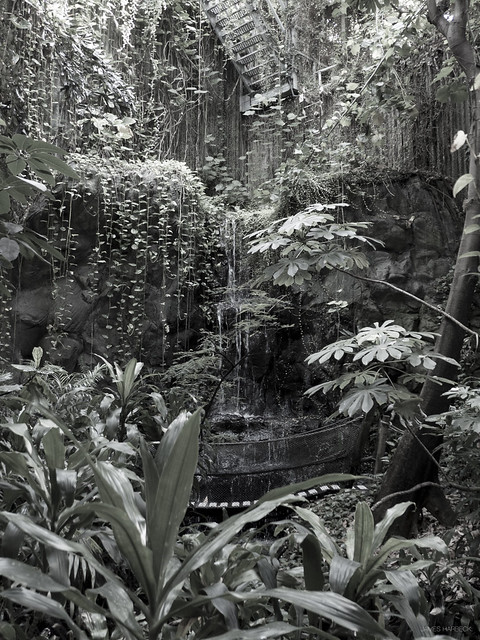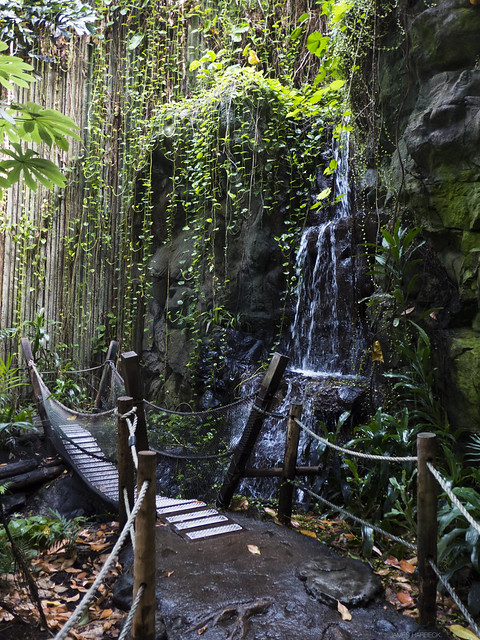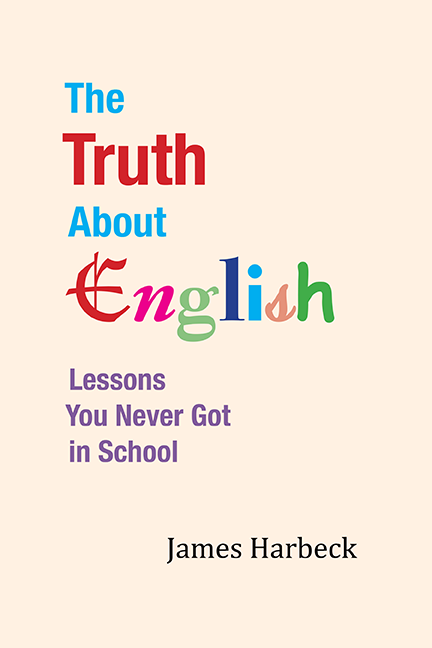A scene utterly ridden with (as opposed to rid of) flowers, or having that general sense or quality literally or metaphorically, is called florid. What about when there aren’t many flowers but there are a whole lot of leaves and other green things?
Well, yes, there’s verdant, which is a fervent-sounding word, faintly suggesting vermin but generally with more verve and offering something covered and dancing with green, perhaps in Vernon, BC, or some place yet to be discovered. But verdant is a Latinate word, with that open-shirted v and all that. How about something Greek-derived? And to rhyme with florid?
What’s the Greek root for ‘green’? You see it in chlorophyll, which is formed from χλωρός khlóros ‘green’ and ϕύλλον fullon ‘leaf’ (note how Latin transliterated the Greek differently from how we tend to today). Yes, that chlor that also shows up in chlorine. Does it sound unpleasant? We may have bad associations with it, thanks to Clorox. But it has two lovely liquids – /l/ and /r/ – and that velar fricative in the original, so often written as ch in Gaelic and German and other languages, and when you hear it in Irish Gaelic, the language of the Emerald Isle, it sure doesn’t sound so horrid. Not that Irish uses a chlor word for ‘green’; actually, the Irish word is glas, which can also mean ‘grey’. Yes, in Ireland green and grey are thought of as the same colour. From what I’ve heard (and pictures I’ve seen), this makes sense: grey shades into green there. And many other places too.
But that is a digression. The word we are looking for is obviously chlorid. As in “I walked into a concrete-walled room dripping with mist and overgrown with plants but few flowers; it was not arid or frigid but humid and vivid, suitable for annelids and aphids and triffids, and probably also orchids, but it was not florid, simply pervasively and irrepressibly chlorid.”
But is this a word? A real word? Well, I can’t swear that anyone would understand it were you to use it. Not so many people know the sense of the chlor root. But it has been used and is in a dictionary. A dictionary: the Oxford English Dictionary. With one citation, from 1822. And that citation appears to refer to complexion or skin tint.
So a person might say “You’re looking a little greenish, lad. Positively chlorid, in fact.” Sure, that would work. But I can think of no especially good reason not to take this word made of known parts and press it into service for other green-hued things if we want. As long as we don’t mind that many readers will think it a typo for chloride and will come to a variety of inferential misadventures on that basis.
Still. Why not have another special secret word for verdant? With a different flavour and tone? A word like a special room full of green plants and rain hidden in a brutalist building?









In response to your closing query: There is such a word. And it even ends with “id”.
Virid.
As for “chlorid”, I would certainly be inclined to apply that to the aroma of an indoor public swimming pool
Ah, yes, virid. Forgot about that one. I’ve used viridescent a few more times. But it doesn’t rhyme with florid! (Also it sounds kinda viral.)
Well, as many a person will think (if not point out), green serves quite well for most purposes in English. Still, it’s nice to have all these extra toys.
Cool
This makes me smile. I’m always stuck in dictionaries and thesauruses wondering why there isn’t yet a word to convey the thing and the feeling, to stoke the tone I’m trying to work and fluff and evoke. Language is wonderful and broad, but sometimes there’s reason to yank at her seams. 😉
Reblogged this on #shyamis and commented:
its super
Love your words and photos! Do you prefer color or black and white? http://www.segmation.com/blog
I shoot in colour but convert to black and white when I think it will produce better results. The photo at the top is actually technically still colour; I just reduced the saturation to almost B&W.
Pretty awesome blog! Mind checking out mine? https://iamjishnu.wordpress.com/
Wonderful
Nicely put. I learned a thing or two from your post. Thanks.
Wow great post 😍
Keep on
Nice
I really like this! I feel like these descriptions are much more accurate than that of a dictionary. You have officially caught my attention, sir. I can’t wait to see more of you!
I love the wonderful seen of the amazing picture
I really like this! I feel like these descriptions are more accurate than that of a dictionary’s. I’m officially hooked (and officially following)! 🙂
Can’t wait to see more of you!
As an aging English teacher, I endorse ‘chlorid’…
I like your endorsement.
This was lovely, thank you for sharing!
Félicitations pour ce post 🙂
Pingback: chlorid | superlineblog M.V.P
Beautifully written… your words flow like water
good word, chlorid. Like it…
Very good
I love it!
that’s an amazing view
So niiiiiiiiice
Great post! Beautiful photograph!
Let’s make this a thing.
Verdant, now i know it 🙂 I love the pictures
Beautiful
Here is some P0SITIVE VIBES:
Positive vibes https://iamjishnu.wordpress.com/2015/10/14/positive-vibes/
Nice to learn that and photos are beautiful.
But we should ask what’s the mission of the leaf? Not photosynthesis. No fall is the real mission of leaf.
You can see what I meant on my blog 😉
badgersclub.wordpress.com
Very nice article, I love learning new things 🙂 Thank you!
The pictur
Sorry, pushed enter by mistake. Wanted to say that the picture goes very well with the text
This is great. I love green things, and new words. I’m not an expert on word origins but they definitely interest me. Also, well done for being Freshly Pressed!
A wonderful word, possibly spelt better wityh a k, in order to minimise the typo misconception and to be more in keeping with its Greek origin (Greek doesn’t have the ch dipthong). Fun writing and a fun idea. I will use klorid in my writing to further confuse my readers. Thanks.
Greek has kappa (κ), though, which is transliterated as k, and if you transliterate the chi (χ) also as k, you obliterate that distinction – not that it matters to the English pronunciation now, of course. And we aren’t able to translate chi with one letter because we don’t have one letter. But kh would do equally well if we wish to indicate the form of the Greek root (since there is nothing else in the Greek kh could stand for; the “h” sound appears only on initial vowels) – it just happens that the word as we have it came by way of Latin, which rendered chi as ch.
But since this isn’t a word virtually anyone knows, the main thing you would do would be just to make it a bit harder for people to look it up. It’s not as though you would be going against the crowd!
Thanks to everyone for the kind comments!
Reblogged this on Lost Dudeist Astrology.
Wonderful post !!
That amazing
Try the survey mound I know a lot of other cool historical sights like mammoth caves,old man’s caves,Ash caves and many others
The surpent mound
As informative as it is entertaining and the prose just flows – thanks for a good read
It’s nice
Reblogged this on Wyrdwend.
Interesting! I feel pretty florid now 🙂
Beautiful article!
Reblogged this on herlix.
Amazing Nature
que belleza, y disfrute , hay un sitio como este llamado tundayme en la amazonia ecuatoriana, lindo clima , comida exotica , tu pones tu ambiente y compania, y nosotros el lugar , ven y conoce la amazonia de ecuador zamora chinchipe!
I’m a bit behind on this feed, other side of the world I guess, or without doing the math, perhaps I should be in front? But, I love your article. I love words and how they’re used. We are so caught up on when to use them that we forget their structure, purpose, usage, history and frankly, it’s all about communication and being human. The use of pictures is art and I am now a new follower. I hope you don’t mind having a follower who has a list of favourite words on her phone? Many do mind, or perhaps they don’t understand this word obsession. Can I put klorid and/or chlorid on my list of words to remember? Cheers, well done.
Beautiful one!
Reblogged this on jmacarpio.
How about “lushful” as an alternative for “verdant”? There we are; new word invented on the house.
Keep up the good work!
Thanks! I like lushful – like a hybrid of lush and lustful.
Reblogged this on Kania-Info .
Delightful post – I’m in love with words and so glad I chanced upon your musings – looking forward to more! Incidentally I actually started with your fascinating piece on Diana Nyad having seen her TED talk.
Reblogged this on ramzan66's Blog .
interesting read. thanks!
Reblogged this on noordin400's Blog.
I shall be using both chlorid and virid in future 😀
As informative as it is entertaining and the prose just flows – thanks for a good read
I just really love that photo.
That’s soooooo coooooooooooool
Love this. Beautifully written!
Lovely photos super writing.
beautifulll
…
Pingback: chlorid | biotronik